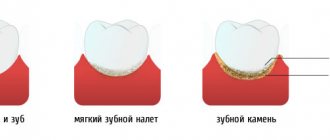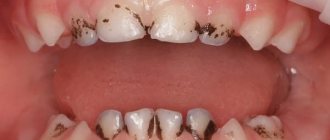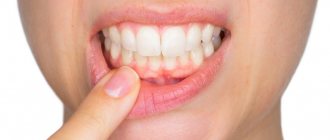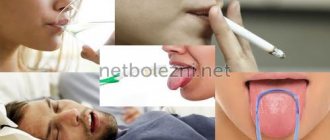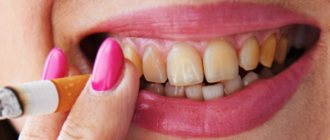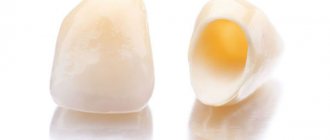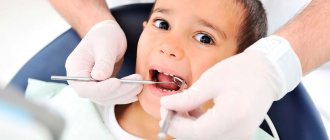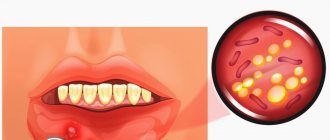What foods stain teeth?
- Coffee
. Lovers of this drink most often have a yellow or brownish coating on their teeth. This is due to the cocoa butter, heavy carbohydrates and sugars contained in coffee. Instant coffee has a greater effect on dental health than ground coffee.
enamel. You can reduce the effect of coffee on your teeth by diluting it with milk or water. It is also best to limit your coffee intake to one cup per day. - Tea
. Contains tannins and, like coffee, stains teeth a yellowish-brown tint. Tea in bags is most harmful to teeth: due to the artificial components contained in it, which happens very often, it stains teeth more than leaf tea. The type of tea - green or black - does not matter. - Wine
. White wine contains acids that negatively affect tooth enamel, causing microcracks to appear through which coloring substances penetrate deeper. Red wine contains tannins and a burgundy-red tint, which also contributes to tooth staining. - Carbonated drinks
. Not only do they change the color of your teeth, but they can also leach calcium from your teeth. In addition to a huge amount of sugar, they contain malic, citric and other acids that literally “corrode” the enamel. You should especially beware of colored soda - it not only corrodes the enamel, but can also stain the tongue and teeth in poisonous colors. If you decide to drink Coca-Cola, do it through a straw, this will reduce the harmful effects on your teeth. - Juices
. Bright and dark juices, such as pomegranate, cranberry, grapefruit, etc., due to their bright color, can also cause yellowing of teeth. It is healthier to simply eat fruit or drink juice diluted with water. - Vegetables and fruits
. Berries that are rich and dark in color, such as blueberries, blackberries, blueberries, cherries, and cranberries, can cause staining and yellowing of teeth. Among vegetables, beets are a strong dye due to the high content of chromogens in them. To prevent dark plaque from forming on your teeth, it is recommended to brush your teeth immediately after eating beets. - Sauces and seasonings
. Many seasonings that have a yellow or brown tint are also on the list of foods that stain teeth. Due to their bright color and high acid content, tomato-based sauces are harmful to teeth. Also, do not overuse soy sauce. - Chocolate and ice cream
. Chocolate and caramel from their color also lead to darkening of the enamel. As for ice cream, sweet and fruit desserts, they contain artificial food colors and chemical components that lead to microtrauma and staining of teeth.
To avoid staining and maintain the natural color and health of your teeth, we recommend visiting a dentist once every 6 months for professional oral hygiene.
You can make an appointment by phone. 8(863)2098902.
What are the dangers of coronavirus vaccination?
What we know about COVID-19?
This is an RNA virus of animal origin belonging to the group of coronaviruses. According to WHO, it is transmitted from a sick person through small droplets that are released from the nose and mouth when sneezing and coughing. From the moment of infection until the appearance of the first symptoms, it takes from 1 to 14 days (on average - 7). The carrier of the virus does not yet know about his illness, but in terms of infection he already poses a danger to others. According to coronavirus epidemiology, COVID-19 is 2-3 times more contagious than the flu, but 2-3 times less contagious than measles.
With a mild course of the disease, its symptoms are similar to ARVI and end with recovery after 14 days without any further consequences. In severe cases, COVID lasts up to 8 weeks. Even in the absence of pronounced signs of the disease, immunity is formed in those who have recovered from the disease. But given the infrequent cases of re-infection, it does not last too long. The vaccine has a much greater effect.
How does the vaccine work?
Today, several immunodrugs are used in the world, developed by specialists from different countries and having passed the necessary clinical trials. All of them are designed to form immunity to the pathogen. After their administration, the immune system:
- easily recognizes the infectious agent;
- begins to produce antibodies - proteins to fight the disease;
- “remembers” the pathogen and, if it enters the body again, quickly destroys it, preventing the development of the disease.
A person who has been vaccinated develops lasting immunity to COVID.
Is vaccination dangerous?
Each person reacts to the immunodrug individually. Therefore, even the best quality vaccine can cause side effects. Their appearance for a short time is the only danger.
Why is vaccination against coronavirus dangerous?
- slight increase in temperature;
- headache, dizziness;
- abnormal heart rhythm;
- skin rashes;
- weakness.
These unpleasant symptoms disappear within a few days.
Severe conditions after administration of an immunodrug can develop in people who have contraindications. Vaccination should not be carried out if:
- chronic pathologies of the kidneys, cardiovascular system (CVS), endocrine system;
- diseases of the hematopoietic system;
- autoimmune disorders;
- severe pathologies of the central nervous system (CNS);
- allergic reactions to previously administered vaccines.
In these pathologies, vaccination can provoke an exacerbation.
Also contraindicated are age (under 18 and over 65 years), pregnancy, or recent severe form of coronavirus infection. People who have been ill have a high level of antibodies during the first time after recovery, and the vaccine will increase it even more. The consequences may manifest as a violent immune reaction in the form of a cytokine storm.
How to reduce negative manifestations?
Following all doctor’s recommendations will help reduce the development of side effects. To reduce the risk of developing negative symptoms after vaccination, you need to:
- closely monitor your well-being;
- at least a week before the intended vaccination, avoid contact with sick people;
- 2 days before vaccination, undergo an examination and donate blood for antibodies;
- give up immunomodulators and immunostimulants 10 days before the vaccine;
- Before administering the vaccine, warn about taking medications that stimulate the immune system.
In the absence of contraindications and compliance with all requirements, the risk of side effects is minimized.
After vaccination against coronavirus, doctors advise following a gentle regimen and drinking at least 1.5 liters of fluid per day. When the temperature rises, it is recommended to take an antipyretic drug. If weakness does not go away within a few days, or allergic reactions occur, you should immediately consult a doctor.
When will there be mass vaccination?
Mass vaccination in the USA, Canada and European countries began in December last year. At the same time, it started in Russia. But at the initial stage, the event was held only for a certain category of people - young people and those who, due to the nature of their professional activities, cannot limit the number of contacts. Today you can get vaccinated against Covid in any region of the country.
Each person makes the decision to vaccinate independently. But those who refuse vaccination should know that even a mild form of COVID is a serious blow to the body. Also, do not forget about loss of ability to work for at least 2 weeks, and the likelihood of infection of family members. After vaccination, these risks are significantly reduced. But even vaccinated people need to wear a mask and gloves to protect themselves 100% from contracting COVID-19.
Sources
“Vaccination against COVID-19. Answers to frequently asked questions", Ministry of Health of the Russian Federation https://static-0.minzdrav.gov.ru/system/attachments/attaches/000/054/706/original/%D0%9E%D1%82%D0% B2%D0%B5%D1%82%D1%8B_%D0%BF%D0%BE_%D0%B2%D0%B0%D0%BA%D1%86%D0%B8%D0%BD%D0%B0% D1%86%D0%B8%D0%B8_COVID_19-19.02.2021-Red.pdf
“Coronavirus - symptoms, signs, general information, answers to questions”, Ministry of Health of the Russian Federation https://covid19.rosminzdrav.ru/
“Symptoms of Coronavirus,” US Centers for Disease Control and Prevention https://www.cdc.gov/coronavirus/2019-ncov/symptoms-testing/symptoms.html
Benefits of tea for teeth
Along with the development of the tea industry, scientists conducted research into the properties of this drink .
For your information! Studying the molecular composition of tea, experts came to the conclusion that depending on the type of tea, the body experiences the effects of its components.
Black
Black tea contains theotanin, a substance that has a bactericidal effect . Once in the oral cavity, the liquid eliminates harmful bacteria and microorganisms, counteracting the development of caries or slowing down its growth. Theotanin components slow down the growth and reproduction of bacteria in dental plaque and promote easy cleansing of the oral cavity.
Drinking a cup of black tea after a meal will have a positive effect on the cleanliness and health of your teeth.
It is recommended to drink liquid 20 - 30 minutes after eating for proper functioning of the gastrointestinal tract.
Green
Green tea has a large amount of flavonoids - components responsible for reducing inflammatory processes and improving blood supply to the gums.
- The flavonoid cahetin contained in the drink prevents the occurrence of periodontal disease , since this substance is 97% active antioxidant.
- Unlike the black variety, green tea contains significantly less theotanin , however, due to its properties, this drink can be drunk in large quantities.
- Scientists at Penn State University have identified high levels of epigallocachetin-3-gallate in green tea. This compound creates the production of reactive oxygen species, strengthening healthy oral cells and starting the process of destroying cancer cells . Thus, it has been proven that green tea protects the oral cavity from cancer .
Both types of drink have an optimal fluoride content, which helps strengthen enamel and prevent the development of caries .
Adding a slice of lemon to a drink can increase the amount of cahetins by 7 times and significantly increase the level of antioxidants.
However, before drinking such a drink, it is recommended to take into account the harmful properties of lemon juice for the dentition , which consists in damaging the surface of the teeth.
To prevent negative consequences, you should thoroughly rinse your mouth with water or a special rinse immediately after drinking tea, since citric acid settles on the enamel and destroys its structure.
Important! Milk added to tea has a positive effect on dental health.
Milk contains more than 100 types of nutrients and up to 20 types of vitamins , but it has become most valuable due to its high calcium content, which is necessary for strengthening teeth and bones.
Tea significantly facilitates the digestion of milk and improves the absorption of calcium, and the plant proteins contained in tea leaves, mixed with animal proteins of milk, create a unique protein complex that allows you to significantly increase the nutritional properties of the drink.
Relevance
Tea can truly be called the national Russian drink.
Studies evaluating the effect of drinking tea as primary cardiovascular prevention are limited.
The authors of a new prospective cohort study assessed the association between tea consumption and the risk of atherosclerotic cardiovascular disease and overall mortality.
Methods
The study included 100,902 adults from China who participated in the Prediction for ASCVD Risk in China (China-PAR) program. All individuals included in the study had lived in 15 Chinese provinces since 1998.
Information on tea consumption was obtained from questionnaires. Based on the amount of tea consumed per week, 2 groups were divided: drinking tea 3 or more times a week (habitual consumers) and never or rarely drinking tea (less than 3 times a week).
The researchers performed regression analyzes and calculated hazard ratios for atherosclerotic cardiovascular events and death.
Useful video
From this video you will learn how long after you can eat and drink after tooth extraction:
Tea is considered the safest drink for teeth, since only its excessive consumption can lead to negative consequences in the form of discoloration of tooth enamel.
When purchasing a product, it is recommended to take into account its composition and duration of storage , since flavors and fruits in the composition have a different effect on the teeth, and the storage time of the product contributes to the accumulation of fluoride compounds in tea leaves.
results
- During a mean follow-up period of 7.3 years, 3683 atherosclerotic cardiovascular events, 1477 deaths due to atherosclerotic cardiovascular causes, and 5479 deaths from any cause occurred.
- Compared with those who never or rarely drank tea, drinking tea 3 or more times per week was associated with a 20% reduction in the risk of atherosclerotic cardiovascular events (hazard ratio, 0.80 (0.75–0.87)), death for atherosclerotic cardiovascular causes by 22% (hazard ratio, 0.78 (0.69–0.88), and all-cause death by 15% (hazard ratio, 0.85 (0.79–0.90).
- Tea drinkers had a 1.4 year longer period of life without atherosclerotic cardiovascular events.
- This association was stronger for study participants who drank tea 3 or more times throughout the observation period.
- Note that the association between tea consumption and cardiovascular events was observed for green tea, but not for black tea.

